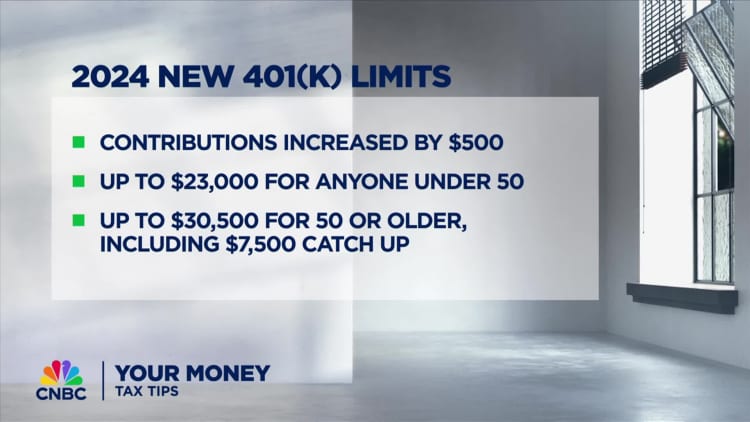
JGI/Jamie Grill | Mix Photos | Getty Photos
Millennials’ retirement prospects appear rockier than these of older generations of Individuals.
That is largely a perform of long-term coverage modifications — like a later age for full Social Safety advantages and a shift to 401(okay)-type plans — longer common lifespans and an even bigger scholar debt burden relative to cohorts like Technology X and child boomers, in response to retirement specialists.
Nonetheless, there’s room for optimism as a result of youthful households have some benefits that will permit them to make up misplaced floor.
“Millennials are behind,” stated Craig Copeland, director of wealth advantages analysis on the Worker Profit Analysis Institute. “However they’ve time to catch up, too.”
Millennials, a cohort born from roughly 1981 to 1996, are the nation’s largest grownup technology. They will be 28 to 43 years outdated this 12 months.
By comparability, people in Gen X have been born from 1965 to 1980, and child boomers from 1946 to 1964.
‘Deteriorating’ retirement outlook
About 38% of early millennials (these born within the Eighties) can have “insufficient” retirement revenue at age 70, in response to projections from a 2022 City Institute examine.
By comparability, 28% to 30% of early and late boomers and 35% of early Gen Xers are projected to have insufficient revenue, in response to the examine. It measures revenue from Social Safety, different authorities money advantages, earnings, pensions and 401(okay)-type plans.
“We do see the retirement outlook deteriorating for future generations,” together with millennials, stated Richard Johnson, director of City’s retirement coverage program and co-author of the report.
The City examine measures revenue inadequacy in two methods: both an incapacity to interchange at the least 75% of 1’s pre-retirement earnings (i.e., a decline in dwelling requirements), or revenue that falls within the backside quarter of the annual U.S. common wage (i.e., not with the ability to meet fundamental wants), Johnson stated. It assumes all cohorts will get full Social Safety advantages underneath present regulation.
Early millennials of coloration, those that aren’t married, and people with little schooling and restricted lifetime earnings are in an “particularly precarious” place, in response to the City report.
Millennials’ scholar loans dent their internet value
A 2021 paper by the Middle for Retirement Analysis at Boston School had related findings.
Whereas millennials seem like boomers and Gen Xers in some ways — they’ve comparable homeownership, marriage charges and labor-market expertise at related ages, for instance — they’re “nicely behind” on whole wealth accumulation, CRR stated.
For instance, millennials ages 34 to 38 have a net-wealth-to-income ratio of 70%, a lot decrease than the 110% and 82% for Gen X and late boomers, respectively, after they have been the identical age, in response to its report. Likewise, internet wealth for 31- to 34-year-olds is 53% of their annual revenue, versus 76% and 59% for equally aged Gen Xers and boomers, respectively.
The first purpose for the wealth hole: scholar loans, CRR discovered.
Millennials are behind. However they’ve time to catch up, too.
Craig Copeland
director of wealth advantages analysis on the Worker Profit Analysis Institute
Greater than 42% of millennials ages 25 to 36 have scholar debt, versus 24% of Gen Xers at that age, in response to a 2021 EBRI examine.
Family wealth for the standard millennial family was about three-quarters that of Gen X on the identical ages ($23,130 vs. $32,359, respectively), regardless of millennials having extra residence fairness and bigger 401(okay) balances, EBRI discovered.
“Scholar loans are actually taking a dent out of [millennials’] internet value,” stated Anqi Chen, a co-author of the 2021 CRR report and the middle’s assistant director of financial savings analysis. “It is unclear how that can play out in the long term.”
To that time, 58% of millennials say debt is a headwind to saving for retirement, in comparison with 34% of boomers, for instance, in response to an annual ballot by the Transamerica Middle for Retirement Research.
Why pensions offered extra safety
Millennials produce other disadvantages in comparison with older generations.
For one, longer lifespans imply they need to stretch their financial savings over extra years. Out-of-pocket healthcare prices and people for providers like long-term care have spiked, they usually’re extra prone to have youngsters at later ages, specialists stated.
Additional, whereas older staff with entry to office retirement plans relied on pension revenue, staff as we speak (particularly these within the personal sector) largely have 401(okay)-type plans.
“Pensions began to go away within the mid-’90s, when Gen Xers have been simply beginning within the workforce and millennials have been nonetheless in grade college,” Copeland stated.
Extra from Private Finance:
Why working longer is a foul retirement plan
This account is like an ‘additional power’ Roth IRA
Are U.S. seniors among the many developed world’s poorest?
Pensions give a assured revenue stream for all times, with contributions, investing and payouts managed by employers; 401(okay) plans offload that accountability onto staff, who could also be ill-equipped to handle it.
In 2020, 12 million private-sector staff have been actively taking part in pensions, whereas 85 million did so in a 401(okay)-type plan, in accordance to EBRI.
Whereas staff can doubtlessly amass a bigger nest egg with a 401(okay), the “large concern” is that advantages do not accrue robotically as with a pension, Copeland stated.

“The outdated pension system did not work for everybody,” Johnson stated. “But it surely did present extra safety than the 401(okay) system does as we speak.”
In the meantime, the final main Social Safety overhaul, in 1983, steadily raised this system’s “full retirement age” to 67 years outdated. (That is the age at which individuals born in 1960 or later can get 100% of their earned profit.)
That enhance, from age 65, delivers an efficient 13% profit minimize for impacted staff, in accordance to the Middle on Finances and Coverage Priorities.
Congress could ship extra profit cuts to shore up Social Safety’s shaky monetary footing; such reductions would seemingly affect youthful generations.
Millennials have benefits, too
After all, millennials even have benefits that imply as we speak’s gloomy retirement prospects will not essentially turn into actuality.
For one, whereas millennials shoulder extra scholar debt, they’re additionally extra educated. That can make it simpler to avoid wasting for retirement, in response to a Brookings Establishment report. Larger academic attainment typically interprets to larger wages; larger earners additionally have a tendency to avoid wasting extra of their revenue, be more healthy, and have much less bodily demanding jobs, it stated.
Pensions additionally typically incentivize retirement at a comparatively early age, which means 401(okay) accountholders could keep within the workforce longer, making it simpler to finance their retirement, in response to the report’s authors, William Gale, Hilary Gelfond and Jason Fichtner.
The outdated pension system did not work for everybody. But it surely did present extra safety than the 401(okay) system does as we speak.
Richard Johnson
director of the City Institute’s retirement coverage program
401(okay) plans are additionally adapting to spice up participation and financial savings for lined staff.
For instance, computerized enrollment and computerized contribution will increase have grown extra in style with employers. A latest regulation, Safe 2.0, additionally made it simpler for staff to obtain a 401(okay) match from their employer whereas paying down scholar debt.
Vanguard Group, an asset supervisor and retirement plan supplier, discovered that 401(okay) enhancements have helped put a subset of millennials (age 37 to 41) forward of older cohorts in retirement preparedness. For instance, the standard “early” millennial is projected to interchange 58% of their job earnings with retirement revenue, relative to 50% for late boomers (age 61 to 65), in response to a latest Vanguard report.
So, whereas there’s trigger for concern, there’s additionally room for optimism, specialists stated.
“You are not likely going to know for 40, 50 years” how this performed out, stated Copeland.
What to do if you happen to’re behind on retirement financial savings
Younger savers who really feel behind on constructing their nest egg ought to attempt growing their financial savings incrementally, in response to Sean Deviney, an authorized monetary planner primarily based in Fort Lauderdale, Florida.
The purpose is to finally save at the least as much as your full firm matching contribution; retirement planners typically suggest contributing at the least 15% of pay to a 401(okay), between a employee’s and firm’s contribution.
Savers who cannot do that ought to begin small as a substitute of forgoing saving solely, Deviney stated.
“Even if you happen to simply begin with 1% of pay — one penny on each greenback — it begins that automated financial savings course of for you,” Deviney stated. “For those who do it in small steps, it is a lot simpler than making an attempt to do some large change.”
Automate financial savings to the extent potential so it is on auto pilot, resembling by turning on a perform that robotically escalates financial savings by 1% or extra every year, he added.
Nonetheless, households ought to typically first prioritize paying down “unhealthy” debt like bank card payments, which carry a excessive rate of interest, Deviney stated. Construct up a number of months of emergency financial savings and be sure you’re not spending greater than you make every month; in any other case, households could extra readily flip to bank cards to fund their way of life.
Additional, do not forgo your retirement financial savings to avoid wasting for a kid’s school schooling, he stated. There are various methods to fund schooling — grants, scholarships and loans, for instance — however “not quite a lot of methods to fund your individual retirement,” he stated.

